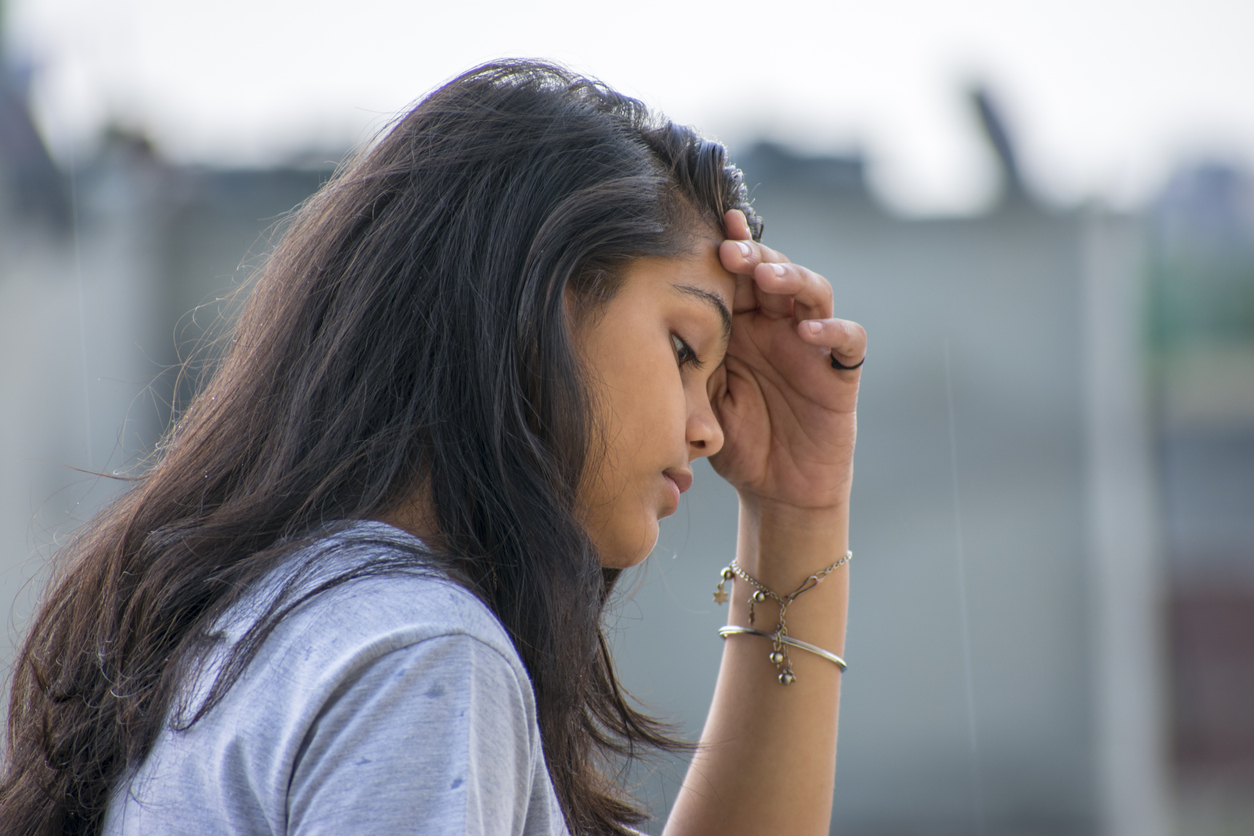Article written by Denver Therapist, Molly Ward
Summer time for teens can often be seen as a fun, carefree time filled with adventure, freedom and time spent with friends.
We might assume all teens look forward to summer, but there can be a more difficult side of summer for teens that can be overlooked. Teen depression.
There are a number of factors that may contribute to an increase in depression in teens during the summer.
Summertime Factors Affecting Your Teen’s Mental Health
Lack of Routine
The most predominant factor impacting teen’s mental health in the summer is the disruption to their routine.
Teen’s routines during the school year encompasses so many ways that they care for their wellbeing.

Read More: “Understanding Common Mental Health Challenges Faced By Teens”
Although many teens look forward to less routine and more rest during the summer, too much flexibility can make it hard for teen’s to continue helpful behaviors.
Helpful behaviors that tend to slip include waking up and going to bed around the same time, practicing consistent hygiene routines, and engaging in self-care, as they don’t have the same habits that come with their school time routine to keep them on track.
What You Can Do: Talk with your teen to normalize this change and anticipate ways to manage the disruption.
Support your teen with coming up with a plan to continue important habits throughout the summer.
Help them decide what the most important factors are to manage their mental health (ie: movement, social interaction, consistent sleep) and support with setting up a routine that encompasses them.
Allow your teen to drive the bus, but support by gently checking in to hold them accountable.
Decreased Physical Activity
Whether your teen engaged in sports, walked to school, or took a gym class, teen’s physical activity tends to be higher during the school year.
During the summer, teens tend to spend more time in bed and being idle.
With physical activity being a vital protective factor regarding mental health, less movement tends to lead to increased levels of depression and anxiety.
What You Can Do: Help your teen find their personal joyful movement that can keep them engaged over the summer.
This could mean helping them find a recreation sports league they can enjoy, helping them find a gym or workout studio, or including them on family walks or hikes in the mountains.
The most important tip is to let your teen decide what’s best for them. Forcing an activity that they don’t enjoy or picking an activity for them might only create more resistance to the idea of physical activity.
Disruption to Sleep
One of the best habits that we can have with sleep is going to bed and waking up around the same time.

Read More: “What Parents Need To Know About Social Media And Teens’ Self-Esteem”
This idea is often the lowest priority for a teen in the summer as they finally have the opportunity to go to bed and wake up as they please, often at varying hours.
They are also less likely to engage in sleep hygiene habits before bed such as refraining from technology or listening to a sleep story or meditation, leading to a restful night’s sleep.
Without proper sleep habits, mental health can take a big hit.
What You Can Do: Support your teen with continuing sleep hygiene habits that often are forgotten during the summer.
Collaborate with your teen to figure out the best plan to support their sleeping habits.
This might mean discussing bed times, planning to turn off internet at a certain time, or simply checking in with your teen about their plan to handle this.
Less Social Interaction
During school months, there is built in time for teen’s to socialize throughout the day, as well as through extra-curricular activities.
The proximity to other peers also offers opportunity for more social interaction, like going off campus for lunch or making after school plans.
The summer months take more effort for teens to make plans and stay in contact with friends, and for some, can be an opportunity to lean into more introverted tendencies.
Without the convenience of school, others might also learn that they aren’t included in as many plans or there is less engagement from the friends they thought they were closest to.
With more time spent in isolation, there can be more opportunity to compare through social media and Snapchat maps, more time for insecurities to take over, and more rumination overall.
What You Can Do: With your teen, discuss ways that they could maintain social interaction over the summer.
Whether this is through a job, volunteering, taking a class, signing up for a camp, engaging in a therapy group, or just making a goal to have one social engagement a week, allow your teen to decide what will work best for them.
Changes in Eating Patterns
With more flexibility during summer, eating habits tend to fluctuate.
For teens, this could mean skipping meals more often, having less sit down meals, less meals with family, an increase in eating, or consuming more convenient or fast food.
The lack of routine can cause some teens to forget to eat or cause them to eat less consistently.
For others, the increased isolation and lack of movement can increase consumption of food and desires to cope through food.

Read More: “Teens and Anxiety: A Parent’s Guide
For those that struggle with disordered eating, the summer might mean less supervision or accountability in regards to nourishing their bodies properly.
However this change is showing up, drastic changes in eating patterns can be directly correlated to our mental health.
What You Can Do: Continue to encourage sit down family meal times.
This structured time can continue to help create a positive environment around eating, help you check in with your teen’s eating habits, support with maintaining a routine with eating, and allow your teen the time for a well balanced meal.
More Time Spent on Technology
Without structured time during the day that teens are supposed to be off their phones, technology use tends to increase during the summer.
Whether it’s staying up late binging TV or watching Tik Tok or laying in bed in scrolling, we’ve seen the research on what too much technology time can do to anyone’s mental health.
What You Can Do: Encourage your teen to unplug for a certain period of the day.
Just an hour away from technology each week can drastically reduce depression and anxiety symptoms.
Increased Use of Substances
While some teens might have a harder time finding access to substances without the convenience of school, other teens might notice an increase in substance use during the summer.
With the lack of structure, but more time and freedom, some teens might notice more boredom and engage in risky behavior.
Substance use, whether it be nicotine, marijuana, or alcohol, can increase, leading to higher levels of both anxiety and depression.
What You Can Do: Continue to have open communication with your teen about their substance use and mental health.
Research has shown that open communication about substance use rather than an ‘abstinence only’ mentality can help your teen have a healthier relationship with substances.
Signs of Summer Depression in Teens

Read More: “Curious About Our Teen Girls’ Group? We Have Answers”
If your teen is being impacted by any these factors, you may notice the following signs during the summer months:
- Sleep disturbances or insomnia
- Increase isolation and time spent alone (ie: in room)
- Changes in appetite or weight
- Increase in use of substances
- More time spent on technology
- Loss of interest in activities once enjoyed
- Persistent feelings of sadness, depression, or irritability
- Crying often or increased sensitivity
- Fatigue or restlessness
- Engagement in self-harm
- Thoughts of suicide
As the school year picks back up, these symptoms often pass, but if they don’t, your teen may be in need of a higher level of support.
Don’t hesitate to reach out for therapeutic resources should these symptoms persist.
Though not all teens are impacted by summertime depression, many teens often show signs that go unnoticed due to our bias about summer.
Using these tips to check in with your teen and noticing signs before they get too severe can help support your teens mental health and utilize the summer to help your teen rest and rejuvenate.
***

Denver Therapist, Molly Ward
Molly Ward (Licensed Clinical Social Worker) is a family and teen therapist in Denver.
Molly helps teens and their families navigate adolescent experiences like: body image issues, substance use, peer relationships, family relationships, help with navigating school challenges, self-esteem building and more.
She provides individual therapy for teens, family therapy, parent support and therapy for adults in Denver too.
To learn more about Molly, follow her on instagram @therapy_with_molly, read about her and our clinical team on our website, or reach out to book a session today.





